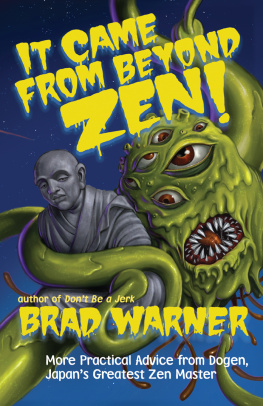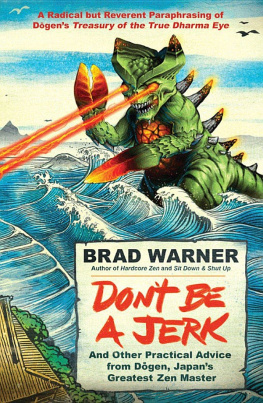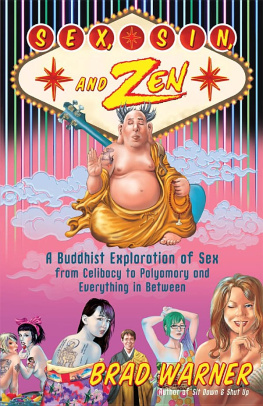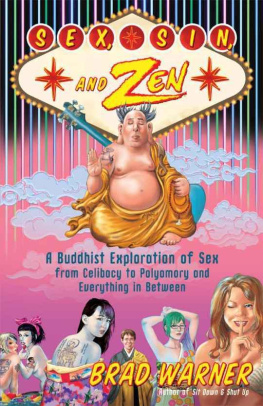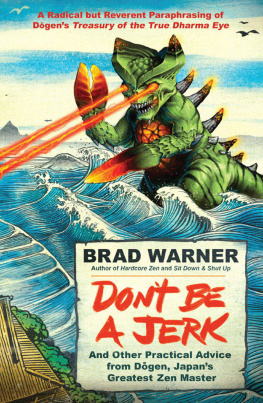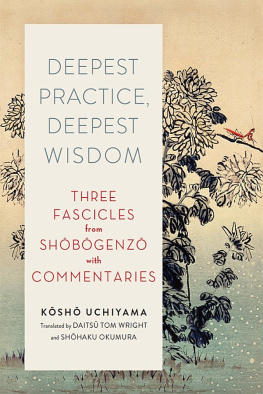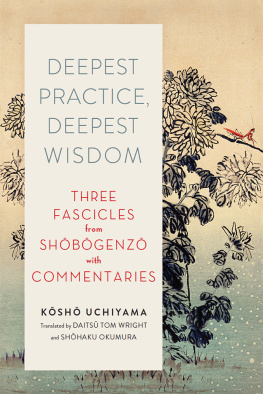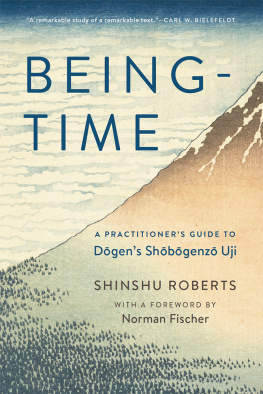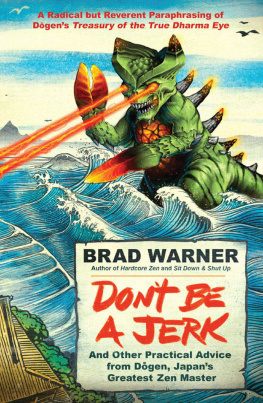Praise for Brad WarnersDont Be a Jerk
A delightful blend of irreverent everydayness, precise scholarship, and heartfelt commitment to practice.
Stephen Batchelor, author of After Buddhism
Warner renders the esoteric [Shobogenzo] into a fun, readable text, conveying its spirit with humor and deep respect.
Publishers Weekly
Whats clear in reading Warners book is his deep respect and lifelong engagement with Dogen....While Warners approach to Dogen may be unorthodox, its freshness might be exactly what the doctor ordered for anyone wanting a way in to the old monks still fresh perspective.
Adam Frank,13.7: Cosmos & Culture blog, NPR.org
Each chapter opens with a passage from the original, which is then carefully and often humorously unpacked....Although the tone may be irreverent and humorous, the book shows the utmost respect for the monk, who has influenced so many over the centuries.
Booklist

ALSO BY BRAD WARNER
Dont Be a Jerk
Hardcore Zen
Sex, Sin, and Zen
Sit Down and Shut Up
There Is No God and He Is Always with You
Zen Wrapped in Karma Dipped in Chocolate


| New World Library 14 Pamaron Way Novato, California 94949 |
Copyright 2017 by Brad Warner
All rights reserved. This book may not be reproduced in whole or in part, stored in a retrieval system, or transmitted in any form or by any means electronic, mechanical, or other without written permission from the publisher, except by a reviewer, who may quote brief passages in a review.
Text design by Tona Pearce Myers
Library of Congress Cataloging-in-Publication data is available.
First printing, October 2017
ISBN 978-1-60868-511-0
Ebook ISBN 978-1-60868-512-7
Printed in Canada on 100% postconsumer-waste recycled paper

| New World Library is proud to be a Gold Certified Environmentally Responsible Publisher. Publisher certification awarded by Green Press Initiative. www.greenpressinitiative.org |
10 9 8 7 6 5 4 3 2 1
CONTENTS
WE CAME VERY close to losing Dogen. When I first heard that Dogen was a Japanese Buddhist monk and writer who lived eight hundred years ago, I just sort of assumed that for the past eight hundred years Dogens teachings were part of the philosophical underpinnings of Japanese society and that we in the West were just now learning about him.
Not so. For the first seven hundred or so years of their existence, Dogens writings were barely known, outside of a few dedicated monks at monasteries scattered throughout Japan. The general populace did not read them. They werent taught anywhere. The copies that existed mostly sat in the backs of temples, slowly rotting away, unloved and neglected, food for mice and moths.
In the eighteenth century there was a small revival of interest in Dogen among Japanese scholars. But it took the Meiji Restoration of the late nineteenth century to get folks really looking into his work. History could easily have gone very differently. If Japan had not been forced to open itself to trade with the Americans, someone else or even the Americans themselves could have come into that tiny, unimportant, technologically backward island nation with modern weapons of war and taken it over by force. It wouldve been a piece of cake! They could have demolished a great deal of Japans culture. So few copies of Dogens writings existed at that time that it would have been easy to destroy all or at least most of his work, and it would have been gone forever.
Even with the way history actually went, it never fails to amaze me that it took centuries before the world was ready for what Dogen was writing. It must have been lonely work for Dogen, spending so much time and effort on a huge-ass book that he knew most of his contemporaries would not understand, one that he could not have been certain would last long enough for the rest of the world to catch up to it.
Ive always been a fan of so-called cult artists. I have an affinity for people who were unknown in their time. But something like, lets say, Pet Sounds, the Beach Boys album that waited twenty years to finally be discovered by hipsters, cant compare to a book that took centuries before it was ever even read by the wider public. At least Pet Sounds made the bottom of the music charts when it was new, before it sank into obscurity for a couple of decades. Dogens writings were unknown to anyone except his students during his lifetime.
And we are still only at the very beginning of a wider international rediscovery of Dogen. The first English translations only began to appear in the seventies. Hell, I was already in the fifth grade when the first English translations of Dogen started to show up at a few little Zen centers out on the West Coast, a long, long way from Wadsworth, Ohio, where I lived. By the time I was old enough to appreciate them, though, copies of those translations were already nearly impossible to come by, at any price. I was there when my own teachers complete English translation of Shobogenzo first came off the printing presses in Tokyo. The book youre reading represents one of the first attempts by anyone outside Japan to create a book about Dogen aimed at an audience other than scholars and devout Buddhist converts.
When I think about what a doofus I am and how completely unqualified I am to even attempt to understand Dogen, I realize I have somehow accidentally become part of something incredibly significant. Thats a funny feeling.
I dont claim to be the final word on Dogen. Far from it. Throughout this book I constantly encourage you to look beyond what Im giving you here. Please find the more orthodox translations and check them out for yourself. Dogens writing contains a depth and a beauty that this book barely even hints at. But I also have to warn you: if you think the stuff youll be reading here is a brain twister, you should see the more reliable translations.
With this book and some of my others, I am hoping to bring Dogens ideas to a broader audience than theyve ever enjoyed before. His philosophy shouldnt just be something that a few academics and religious nuts jealously guard for themselves. Commentaries on them shouldnt be buried in so many brainiac buzzwords that you have to stop and consult a dictionary every third page. His stuff is much too important for that. It needs to be exposed.
Dogen shows us a new and better way to understand ourselves and the world we live in. He shows us, in fact, that the way weve been thinking about stuff for centuries borders on insanity. Hes showing us how to get sane.
Eihei Dogen lived and died in Japan almost eight hundred years ago. And just in case you were wondering, Eihei is pronounced like the letter a followed by the word hey, as in Hey! Ho! Lets go! Dogen is pronounced with a hard g, as in Godzilla so its not Do-jen. Dont ever say Do-jen around me! Ill smack you!
His first name wasnt even Eihei, by the way, nor was Dogen his family name. No one knows for certain what name, first or last, he was given when he was born. Dogen was the dharma name bestowed on him when he became a monk at around age twelve, after which he never used his birth name again, as far as we know. Eihei-ji was the name of the temple he founded much later. As the master of that temple he was called Dogen of Eihei-ji, or Eihei Dogen for short.
Next page
